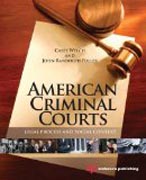
American Criminal Courts: Legal Process and Social Context
Welch, Casey
Fuller, John Randolph
American Criminal Courts: Legal Process and Social Context provides a complete picture of both the theory and day-to-day reality of criminal courts in the United States. The book begins by exploring how democratic processes affect criminal law, the documents that define law, the organizational structure of courts at the federal and state levels, the overlapping authority of the appeals process, and the effect of legal processes such as precedent, jurisdiction, and the underlying philosophies of various types of courts. In practice, criminal courts are staffed by people who represent different perspectives, occupational pressures, and organizational goals. Thus, this book includes chapters on actors in the traditional courtroom workgroup (judges, prosecutors, and defense attorneys, etc.) as well as those outside the court who seek to influence it, including advocacy groups, the media, and politicians. It is the interplay between the court's legal processes and the social actors in the courtroom that makes the application of criminal law fascinating. By focusing on the tension between the law and the actors inside of it, American Criminal Courts: Legal Process and Social Context demonstrates how the courts are a product of law in action and presents content in a way that enables you to understand not only the how of the U.S. criminal court system, but also the why. Clearly explains both the principles underlying the development of criminal law and the practical reality of the court system in actionA complete picture of the criminal justice continuum, including prosecution, defense, judges, juries, sentencing, and pre-trial and appeals processesFeature boxes look at how courts are portrayed in the media; identify landmark due-process cases; illustrate the pros and cons of the courts' discretionary decision-making; examine procedures and the goals of justice; and highlight the various types of careers available within the criminal courts INDICE: Chapter 1: Principles and Decision Making in U.S. Criminal Courts Part 1: Formal Social Control Chapter 2: Social Control, Comparative Courts, and the Development of the U.S. Judicial System Chapter 3: The Structure of Federal and State Courts Chapter 4: Criminal Law, Crime, and the Criminal Court Process Part 2: Negotiating Discretion, Making Decisions Chapter 5: The Reality of Legal Action: Principles, Organizations, and Public Pressure Chapter 6: Case Assessment, Case Attrition, and Decision to Charge Part 3: Decision Making in the Pretrial and Trial Process Chapter 7: The Pre-Trial Process Chapter 8: The Prosecutor and the Exertion of State Power Chapter 9: The Defense and Constraint on State Power Chapter 10: The Criminal Trial Process: Judges, Bench Trials, Jury Deliberation, and Sentencing Part 4: Specialized Courts Chapter 11: The Right to Appeal and the Appellate Process Chapter 12: Juvenile Courts Chapter 13: Specialized Courts Part 5: Frontiers of Justice Chapter 14: Fuzzy Justice: Alternatives to Court Chapter 15: Courts in the Future
- ISBN: 978-1-4557-2599-1
- Editorial: Anderson
- Encuadernacion: Cartoné
- Páginas: 614
- Fecha Publicación: 03/04/2013
- Nº Volúmenes: 1
- Idioma: Inglés
